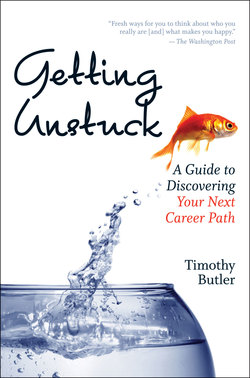Читать книгу Getting Unstuck - Timothy Butler - Страница 14
На сайте Литреса книга снята с продажи.
ONE Facing Crisis
ОглавлениеIT WAS AN AFTERNOON in late spring, a few weeks before her graduation from the Sloan School of Management at MIT, and Marcy Kaufman was feeling unsettled.1 Sitting in my office, she leaned forward in her chair, her short blonde hair framing an alert expression and a direct gaze. I knew this alertness well, and how it could change in a moment from pensive reflection to a mischievous smile. But today her look was more serious; she wanted to know if she could continue counseling with me after graduation.
Marcy was no stranger to big changes or unsettling times. Bright, athletic, and full of energy, she had a history of taking things straight on. She grew up in Los Angeles, the only girl in a family of sports-oriented boys. Her brothers admired her tomboy toughness and let her into their rough-and-tumble crowd. When high school became boring, she arranged to graduate early, at sixteen, and spend six months traveling alone on a bus tour of Africa. At eighteen she enrolled at California Institute of Technology and majored in computer science. She excelled on all fronts. At five feet ten inches tall, she was a standout on the basketball team. She was also a star student and maintained a wide circle of friends. In business graduate school, she enjoyed her classes, her summer internship, and her time with her classmates.
Now twenty-seven, she had arrived at a place that, at least for the moment, seemed far less certain. She had a boyfriend, Henry, but it was not clear just where that stop-and-go relationship was headed. He was working in New England and so, for the time being, she planned to stay in the greater Boston area. But doing what? Marcy had come to MIT because leadership seemed to be her destiny, but, as for many of her fellow students, the best path toward that destiny was not clear. The job market was good, but as Marcy went from interview to interview she was not sure what she was trying to accomplish. Was she looking for the best job or the least bad job that would allow her to stay with Henry? She was no longer a software engineer, but what then was she?
My clients, unique as they are, all come to me for the same reason: they are stuck. They are uncertain about what to do to move closer to a more fulfilling work or life situation. Marcy was at such an impasse. She had “come to the end of her thinking,” and found herself at an uncomfortable crossroads. She felt torn between following her classmates in pursuing high-paying jobs in prestigious firms and her desire to make the relationship with Henry work. Beneath this tension was another source of stress that was even more unsettling, in that it was far more vague and harder to describe. It was more a feeling in the pit of her stomach than a problem that she could formulate and bring to a counselor.
What I as a career counselor and psychotherapist could see, but Marcy could not, is that as we live our lives, things don’t happen in a straight line, a little bit at a time, day by day. Growth as a person does not occur in a predictable and sequential fashion. Many times a path comes to an abrupt halt, only to continue again at a different place, at a different level. Our lives unfold more like that of the caterpillar and butterfly than we are perhaps ready to acknowledge. An impasse like Marcy’s was the first step in changing her very idea about what she really wanted and about how happiness might come into her world.
To understand this, it can be helpful to think of the worlds we inhabited as seven-year-olds and as seventeen-year-olds. Our lives in our second decade are not continuations of our childhood in a bigger body, but are different altogether. The transition to adolescence brought with it a crisis; the seven-year-old’s way of finding happiness in the world simply no longer worked. With struggle, we were able to forge a whole new perspective and a whole new agenda. The lines of our childhood worlds were broken, and new lines began at a very different place on the page. And this sense of disjunction and radical change happens again and again. When we talk about a childhood and adolescence and adulthood, or about Picasso in his Rose Period and then in his Blue Period, or about the early recordings of Miles Davis and then his last, in a real sense we are talking about almost different characters in each case. The change has been that radical and the life being experienced is that different.
In recent decades, developmental psychologists have created highly useful theoretical models of these necessary disjunctures in human development.2 Our concern here, however, is not theoretical. What does it mean to be, like Marcy, at the very point of the break? How do we find a new line of travel? If we simply try our old ways of understanding, it becomes painfully clear that the crisis is deepening.
